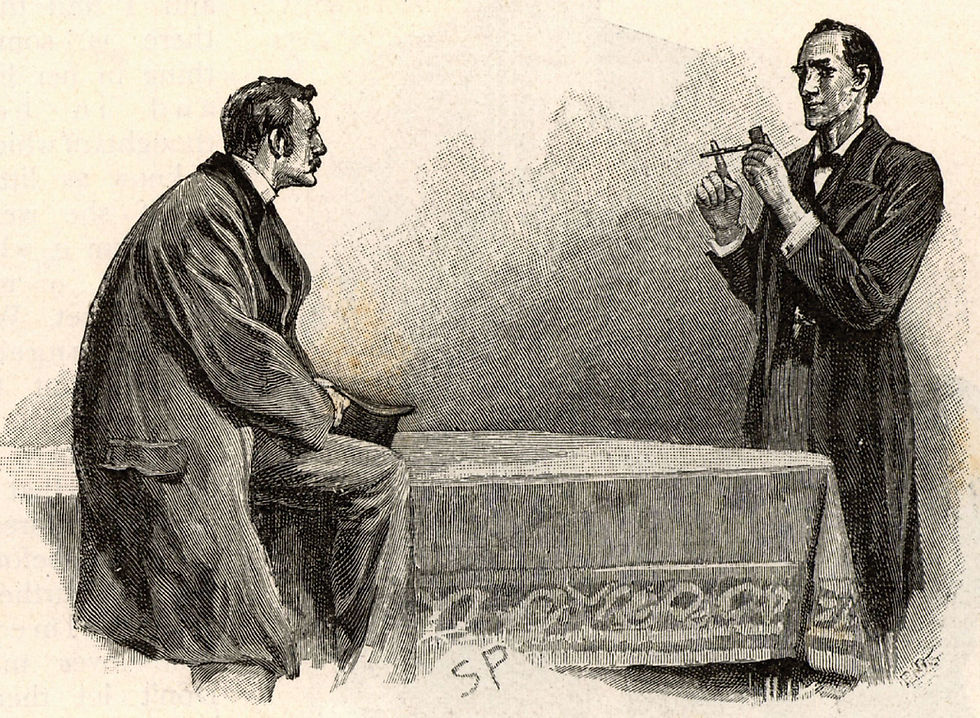Excerpt from my book on horror films pertaining to 1941's The Wolf Man
- Nov 11, 2025
- 3 min read
Tuesday 11/11/25
As it says. This is very good. No film writing like it. Done this morning.
And yet, no one feels quite as blameless as Lon Cheney’s Larry Talbot from 1941’s The Wolf Man. The first Karloff Frankenstein film is a cautionary tale, but The Wolf Man is tragedy, the first and best horror film in this sundered vein. You’d think with all the untimely deaths that the tragic would be more in evidence with horror, but it’s always been something of a surprising rarity, just as The Wolf Man makes for a surprising film. Lon Chaney is Lyle Talbot, who returns to home and hearth and his father Sir John Talbot (Claude Rains) following the death of his brother. The men were estranged, but we see immediately how fond they are of each other. Both are exceedingly likable. The sort of people you wouldn’t mind chatting with if they were in the seat beside you.
Talbot is a flirt, which is a funny role for Cheney, whom we usually regard as a big lug rather than a fellow who doesn’t go home alone unless he wishes to. Larry kindles a romance with a most pulchritudinous antiques dealer in Gwen Conliffe (Evelyn Ankers) that begins with some peeping involving a telescope—different times, when violating someone’s privacy was a nice way to land a date—and all is going quite well until a night out in the foggy forest at the Romani fair, where Larry is bitten by a werewolf who happens to be Bela Lugosi, and his happy days come to a violent end, with said ending lasting for a long, long time, given its cursed nature.
The Wolf Man isn’t discussed in the manner of The Blood on Satan’s Claw or The Wicker Man, but make no mistake: director George Waggner’s film is a touchstone of folk horror (note the terrible “only in nature” primeval splendor of Jack Pierce’s make-up design) and arguably the first such example in American cinema. Writer Curt Siodmak’s script tells an ancient tale tied to the earth, seasoned with ballad-like lines of poesy that also happened—handily—to possess ready-made and lasting pop culture cachet. These are delivered by Maria Ouspenskaya’s Malava character, who is both the Romani elder and Talbot’s surrogate mother on the werewolf side of his personal hellish equation. The latter is a role in which she can only do so much, like a doctor who speaks to a family about managing the pain of a beloved member. All that remains is what must be done, however limited that may feel.
Universal films don’t often take us from happy and lighthearted to sad and doomed, but that’s how the heart of The Wolf Man beats. It’s the closest a horror picture has ever gotten to the likes of a Mississippi Delta blues. Bela Lugosi’ Dracula did everything he could to continue on as a member of the undead; Talbot sings a different song, which he’ll keep singing in a cadre of upcoming films: He yearns to die. And for the mercy of release. As such, he may be the character we feel the most for in the entirety of the medium. It’s as if Hoss from Bonanza, someone you’d think would be the perfect person to grab a beer with, was instead sitting next to you at the saloon having lost both his arms and asking if you might blow his head off so he could be free of his pain, dagnabbit.
We shudder, perhaps, in recalling thoughts—or pondering present thoughts—that have entered our own minds during those hard times that Stephen Foster also enjoined to come again no more. Talbot lacks for hope, and with damn near—sort of—scientific reason. He’s been given not just a death sentence, but a paradoxically perpetual version of the thing. And what does he care the most about? The harm he may do others. After all, a precedent has been swiftly established. The gunk of slashed-open throats is lodged under his fingernails come the morning when he awakens as himself again. But that will only last so long, unlike the curse that now governs his life and won’t release his soul.





Comments